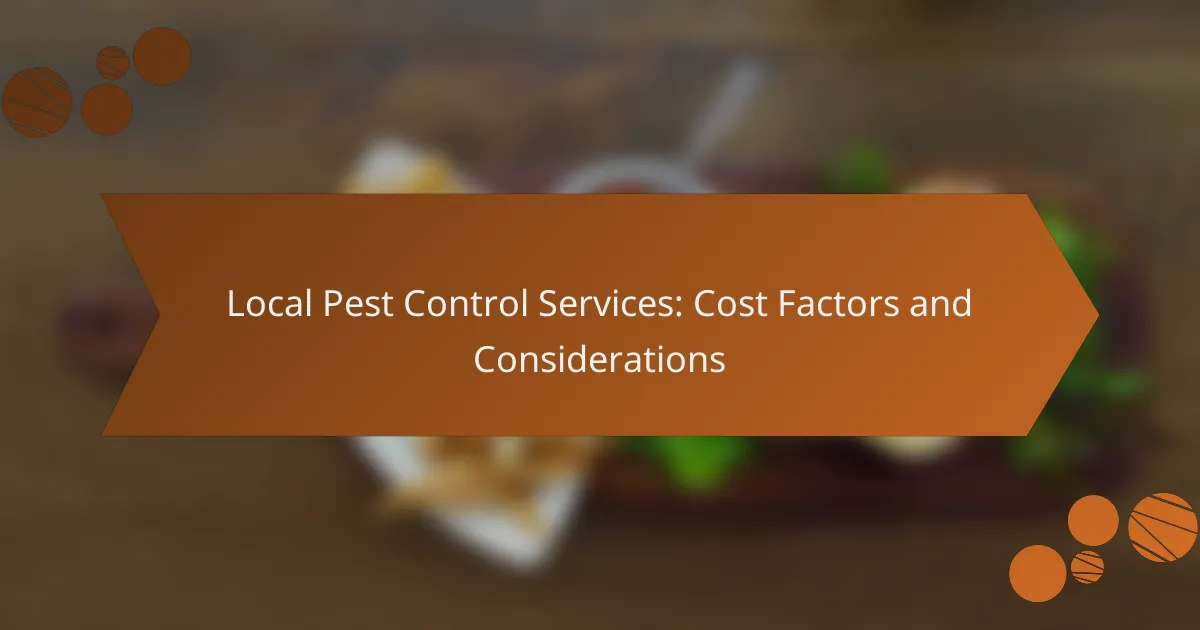Understanding the costs associated with local pest control services is essential for homeowners facing infestations. Prices can fluctuate based on factors like location, pest type, and the severity of the problem, with initial treatments typically ranging from a few tens to several hundred dollars. By researching local providers and comparing their offerings, you can find a service that effectively addresses your pest management needs while ensuring quality and reliability.
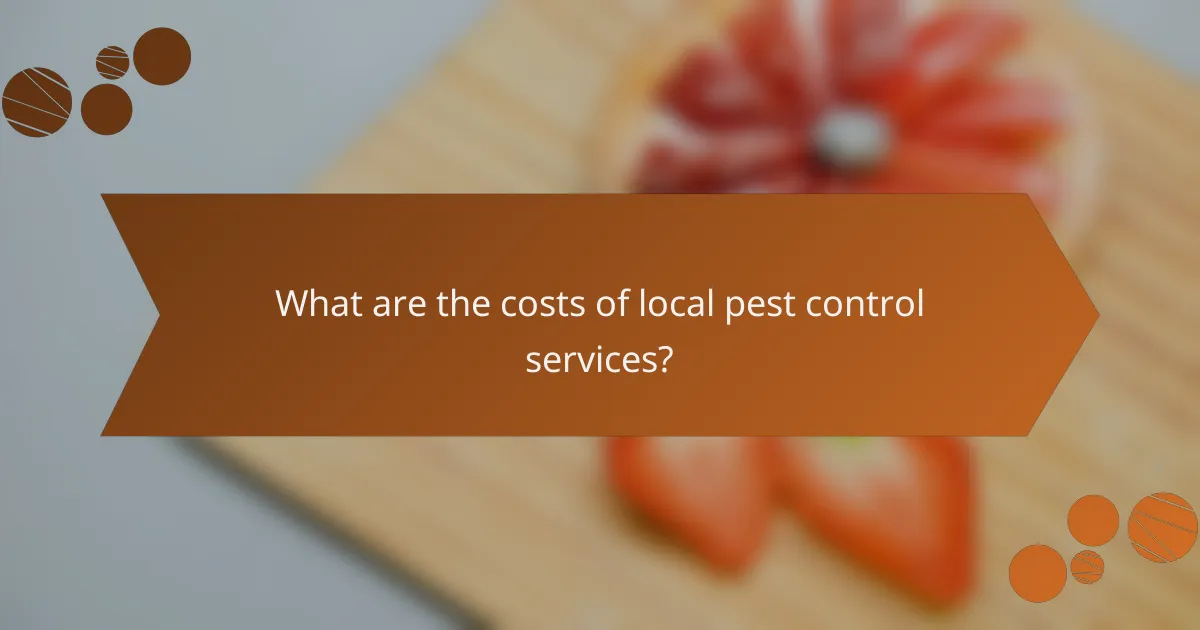
What are the costs of local pest control services?
The costs of local pest control services can vary widely based on factors such as location, type of pest, and the extent of the infestation. Generally, homeowners can expect to pay anywhere from a few tens to a few hundred dollars for initial treatments, with ongoing services often available at a discounted rate.
Average pricing in urban areas
In urban areas, pest control services typically range from around $100 to $300 for initial visits, depending on the severity of the pest issue. For example, a standard treatment for common pests like ants or roaches may cost between $100 and $150, while more complex infestations, such as termites, can escalate to $500 or more.
Monthly or quarterly maintenance plans are often available, costing between $40 and $100 per visit. These plans help prevent future infestations and can be more cost-effective in the long run.
Factors influencing service costs
Geographic location also matters. Urban areas may have higher costs due to increased demand and living expenses, while rural areas might offer lower rates. Lastly, the reputation and experience of the pest control company can impact pricing, with well-established firms often charging a premium.
Seasonal pricing variations
Pest control costs can fluctuate seasonally, with certain times of the year seeing higher demand for services. For example, spring and summer months often experience a surge in pest activity, leading to increased prices and potential wait times for service appointments.
Some companies may offer discounts during the off-peak seasons, such as late fall or winter, when pest activity is typically lower. Homeowners should consider scheduling treatments during these times to save on costs while still addressing pest issues effectively.
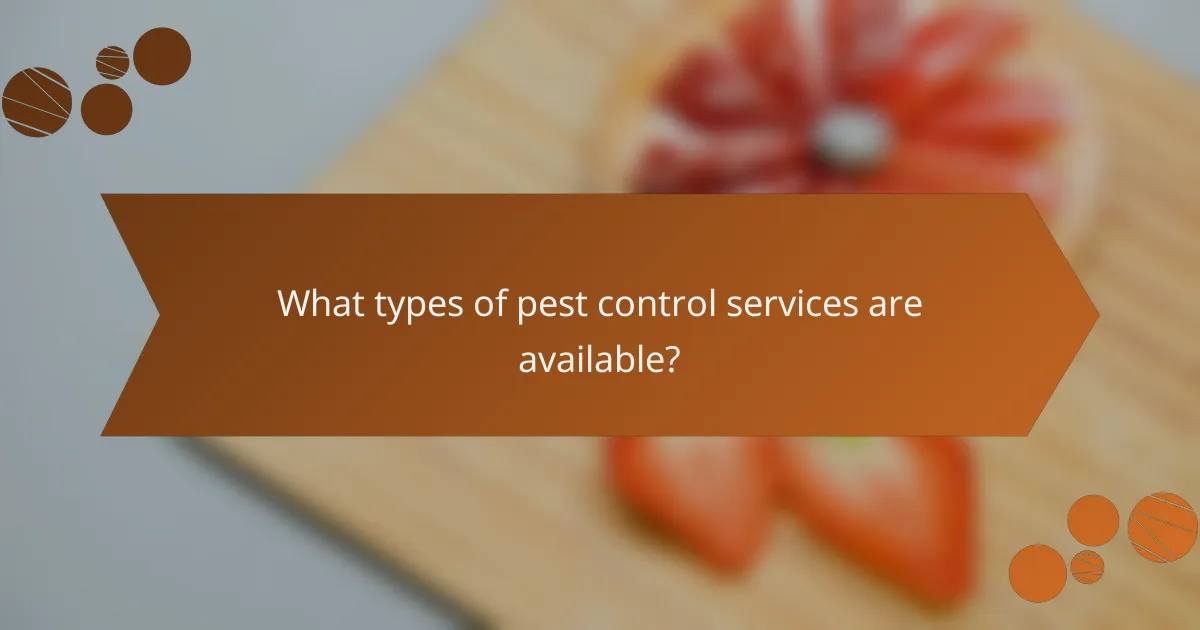
What types of pest control services are available?
There are several types of pest control services tailored to different needs, including residential, commercial, and emergency pest control. Each service addresses specific pest issues and environments, ensuring effective management and eradication of pests.
Residential pest control
Residential pest control focuses on eliminating pests in homes and apartments. Common services include treatments for ants, roaches, termites, and rodents, often involving inspections, preventive measures, and ongoing maintenance plans.
Homeowners should consider factors such as the size of their property and the severity of the infestation when selecting a service. Typical costs can range from $100 to $300 for initial treatments, with follow-up services varying based on frequency and pest type.
Commercial pest control
Commercial pest control services cater to businesses, including restaurants, offices, and warehouses, where pest issues can impact health and operations. These services often require compliance with health regulations and may involve specialized treatments for specific industries.
Businesses should assess their pest risks and choose a service that offers tailored solutions. Costs for commercial pest control can vary widely, typically starting around $200 and increasing based on the size of the facility and the complexity of the pest problem.
Emergency pest control services
Emergency pest control services are designed for urgent pest problems that require immediate attention, such as severe infestations or health hazards. These services are often available 24/7 and can address issues like wasp nests or rodent outbreaks.
When facing an emergency, it’s crucial to act quickly to minimize damage and health risks. Costs for emergency services can be higher than regular treatments, often starting at $150 and potentially exceeding $500 depending on the situation and required response time.
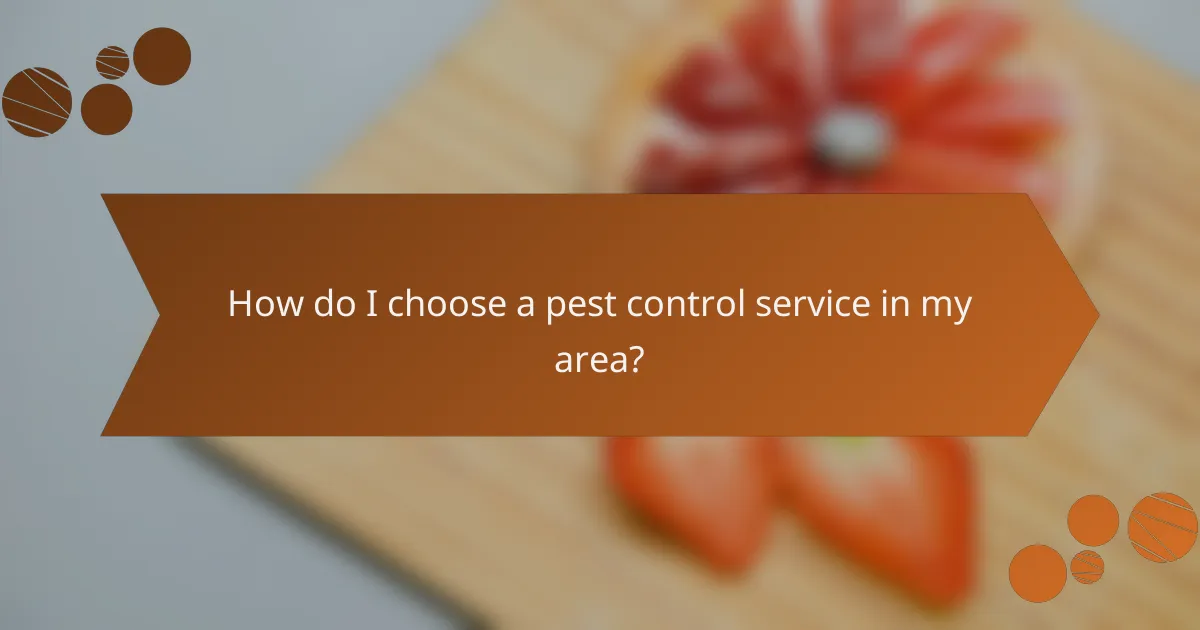
How do I choose a pest control service in my area?
To choose a pest control service in your area, start by researching local companies, comparing their services, and checking customer reviews. Focus on finding a provider that meets your specific pest management needs while ensuring they have a good reputation and proper credentials.
Key selection criteria
When selecting a pest control service, consider factors such as the types of pests they specialize in, the methods they use, and their pricing structure. Look for companies that offer integrated pest management (IPM) solutions, which focus on long-term prevention and minimal chemical use.
Additionally, inquire about their service guarantees and follow-up procedures. A reliable service should provide a clear plan of action and be willing to return if the problem persists after treatment.
Local service reviews
Reading local service reviews is crucial in assessing the quality of pest control companies. Check platforms like Google, Yelp, and local forums to gather insights from previous customers. Pay attention to comments about effectiveness, customer service, and overall satisfaction.
Look for patterns in the reviews; consistent praise or complaints can help you make an informed decision. Consider reaching out to friends or neighbors for personal recommendations as well.
Licensing and certifications
Ensure that the pest control service you choose is licensed and certified according to local regulations. In many areas, pest control operators must have specific training and adhere to safety standards to apply pesticides legally.
Ask to see their licenses and any relevant certifications, such as those from the National Pest Management Association (NPMA) or similar organizations. This not only confirms their legitimacy but also indicates their commitment to safe and effective pest control practices.
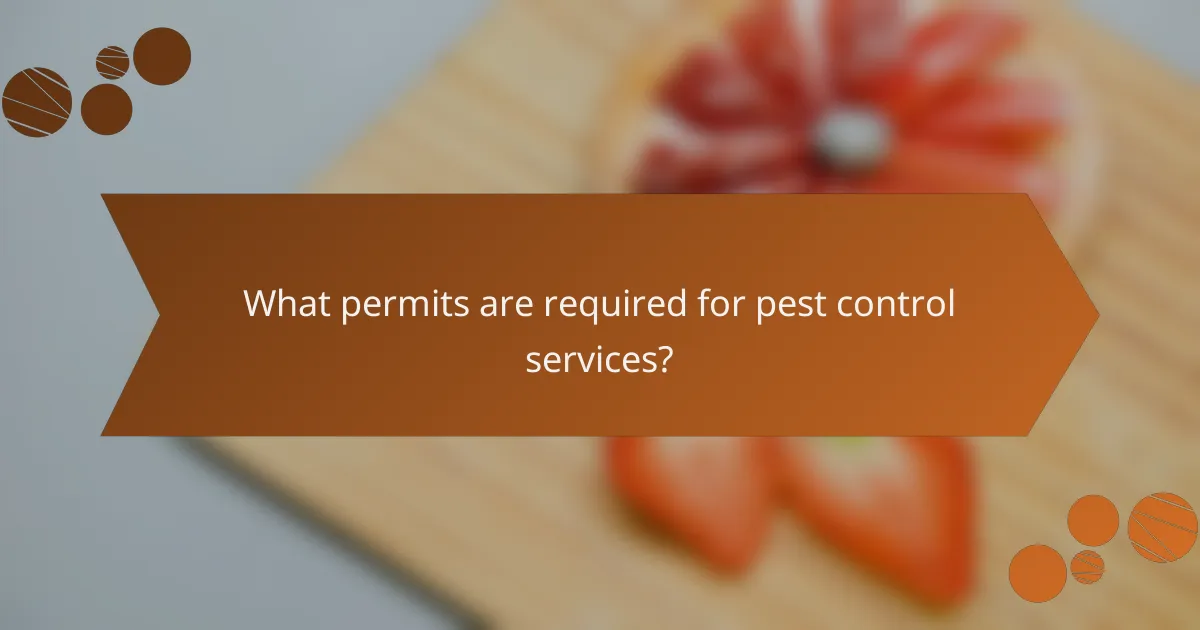
What permits are required for pest control services?
Pest control services typically require specific permits and licenses to operate legally. These requirements vary by state and locality, ensuring that pest control professionals adhere to safety and environmental regulations.
State-specific regulations
Each state has its own regulations governing pest control services, often requiring pest control operators to obtain a state-issued license. This license may involve passing an exam and completing continuing education to stay updated on best practices and safety protocols.
In many states, the licensing process ensures that pest control professionals understand the chemicals they use and the potential impacts on human health and the environment. For example, some states may have stricter rules regarding the use of certain pesticides, necessitating additional training or certification.
Local permits and licenses
In addition to state regulations, local municipalities may impose their own permit requirements for pest control services. These local permits can vary significantly, so it’s essential for operators to check with their city or county government for specific guidelines.
Local permits often focus on the operational aspects of pest control, such as waste disposal and the handling of hazardous materials. Failing to obtain the necessary local permits can result in fines or the suspension of business operations, making compliance crucial for any pest control service provider.
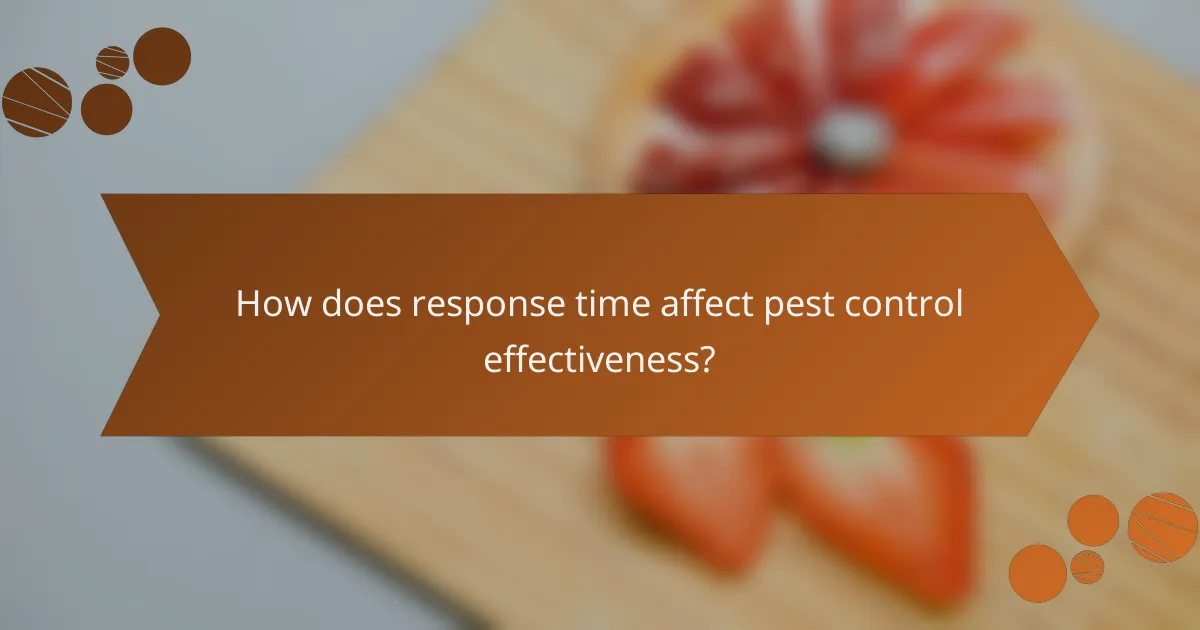
How does response time affect pest control effectiveness?
Response time is critical in pest control as it directly influences the success of treatment. Quick action can prevent infestations from worsening, reducing overall damage and costs.
Importance of quick response
A rapid response to pest control requests can significantly enhance the effectiveness of the treatment. The sooner a pest issue is addressed, the less likely it is to escalate into a larger problem, which can lead to more extensive damage and higher costs.
For example, if a homeowner notices signs of termites, immediate action can prevent structural damage that may require costly repairs. Quick response times can also minimize health risks associated with pests like rodents or cockroaches.
Average response times in major cities
Response times for pest control services can vary widely depending on the city and the service provider. In major cities, average response times typically range from a few hours to a couple of days.
For instance, in metropolitan areas like New York City or Los Angeles, many pest control companies aim to respond within 24 hours, while smaller towns may see response times of 48 hours or more. It’s advisable to check local providers for their specific response times to ensure timely service.
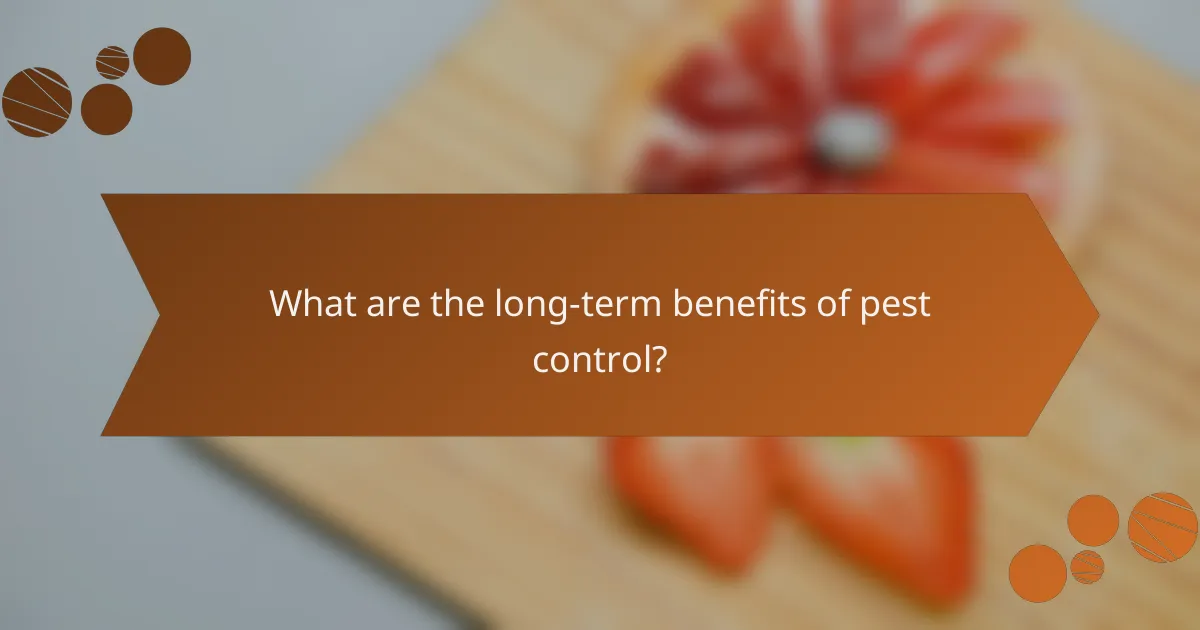
What are the long-term benefits of pest control?
Long-term pest control offers numerous advantages, including the prevention of property damage and the reduction of health risks associated with pests. By maintaining a pest-free environment, homeowners can save on costly repairs and ensure a healthier living space.
Cost savings over time
Investing in pest control can lead to significant cost savings in the long run. Regular treatments can prevent infestations that might otherwise require expensive remediation efforts. For example, a single termite treatment can save homeowners thousands of dollars compared to the cost of repairing structural damage.
Additionally, many pest control services offer maintenance plans that can reduce overall costs. These plans typically involve scheduled inspections and treatments, which can catch potential issues early before they escalate.
Improved health and safety
Effective pest control contributes to a healthier living environment by minimizing exposure to disease-carrying pests. Rodents, cockroaches, and other common pests can trigger allergies and asthma, making pest management essential for families, especially those with young children or elderly members.
Moreover, pest control services often use eco-friendly products that are safe for humans and pets, ensuring that your home remains a safe haven while effectively managing pest populations.
Enhanced property value
Maintaining a pest-free home can enhance property value, making it more appealing to potential buyers. Homes with a history of pest issues may deter buyers, while those with documented pest control measures can command higher prices.
Regular pest control not only protects your investment but also demonstrates responsible homeownership, which can be a selling point in competitive real estate markets.
